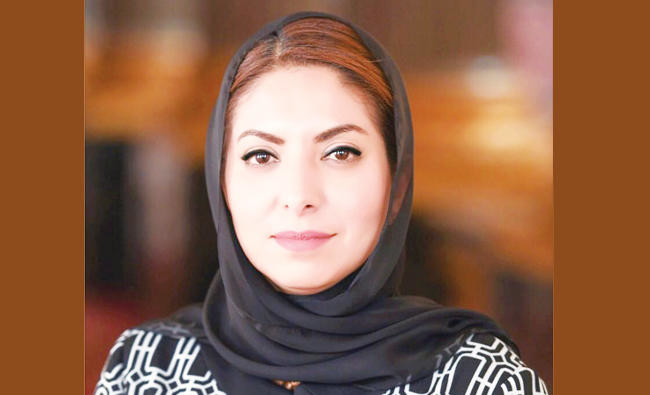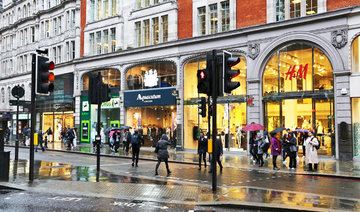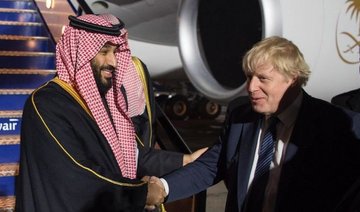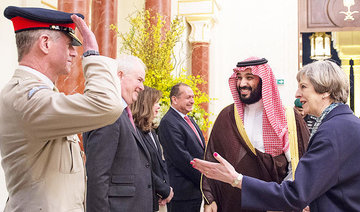LONDON: The visit to the UK by the Crown Prince of Saudi Arabia, Mohammed bin Salman, this week will set the stage for a new trading relationship between the two countries, Dr. Afnan AlShuaiby, head of the Arab-British Chamber of Commerce, predicted.
Sitting in her Mayfair office, AlShuaiby told Arab News that with Brexit on the horizon and the Kingdom seeking to diversify its economy, “the sky is the limit” when it comes to business and trade partnerships.
The crown prince arrives in London on Wednesday and will hold talks with the British prime minister, Theresa May, as well as senior business and intelligence figures.
AlShuaiby said she is optimistic the visit will encourage more UK companies to invest in Saudi Arabia. Britain’s decision to leave the EU made it even more important for British companies to focus on improving trade relations with partners outside Europe, she said.
“I would like to see more British interest in Saudi Arabia and more companies investing in Saudi Arabia, whether they are small and medium companies or even the bigger companies that haven’t explored or been in Saudi Arabia,” she said.
“(The crown prince’s visit) is going to be a very good opportunity for the two sides to finalize agreements together and a way to move forward,” she said. “I would like to see solid agreements come out of it.”
AlShuaiby urged people to look beyond preconceived ideas about Saudi Arabia and consider the benefits the visit could have on UK business and trade.
“When a guest comes, they should be welcomed. That’s a courtesy for any place,” she said
“People don’t know what’s happening in Saudi Arabia, specifically in the past two years. There’s a lot of positivity on all levels and a lot of reforms. I haven’t seen that in the UK media — there is no interest,” she said.
Changes that have made headlines in the UK include the decision last year to allow women to drive, as well as the crown prince’s anti-corruption drive that resulted in hundreds of businessmen and ministers being detained in the luxury Ritz-Carlton hotel in Riyadh last November.
AlShuaiby has been at the forefront of efforts to strengthen business links between the UK and Saudi Arabia since she was appointed secretary general and chief executive of the chamber just over a decade ago. She is the first woman to be appointed to the role in the 40-year history of the organization, set up in the mid-1970s to encourage trade between the UK and other Arab League countries.
The Saudi national gained her first degree at the King Saud University in Riyadh, and went on to complete an MA in educational administration at the American University, followed by a Ph.D. in leadership administration at George Washington University, both in Washington.
In her role at the chamber, she has spearheaded conferences, research services, forums and other networking events to help make key introductions between UK companies and their Saudi Arabian and Arab League counterparts. “We are the matchmaker,” she said.
In 2016, UK exports to Saudi Arabia were worth $6.62 billion compared with $3 billion in 2006, according to World Bank data.
With Saudi Arabia pushing forward with plans to diversify the country’s economy and its reliance on oil, AlShuaiby said business opportunities for UK companies are only likely to grow. The Kingdom’s Vision 2030 strategy, launched in 2016, set out a timetable for economic diversification and social reform.
“The sky is the limit,” she said, noting health care, education, research and development, and cybersecurity as areas of mutual interest between the two countries. There is a “big move” toward renewables as well, she said.
The film and cinema industry is opening up to outside investment, following a decision in December to lift the 35-year ban on cinemas in the Kingdom. Last month, the UK-based cinema chain Vue International signed an agreement with a Saudi partner to open about 30 multiplexes in the Kingdom.
“I think the focus of the visit is going to be geared more toward business and Vision 2030. There is a tremendous move in Saudi Arabia, and things are moving very fast,” she said.
“It is very important that the UK embarks and becomes a strategic partner in this whole vision.
“I would like the government to encourage the private sector in the UK. People need to be reassured — and if the government reassures them, they are more comfortable and will have a better appetite for working with Saudi Arabia,” she said.
AlShuaiby explained that some UK businesses, particularly small-to-medium-sized firms, are reluctant to operate in the Kingdom due to “old stereotypes” about the country.
“British businesses are still a little bit cautious about doing business in Saudi Arabia,” she said, referring to concerns about the country’s business climate and the law surrounding commercial disputes. She insisted that “things have changed” with regard to the legal system.
“We need a different way of viewing things. Not the average stereotype of Saudi Arabia — the desert and camel. That is part of our history and our culture, and we are proud of it, but we have also built skyscrapers. It is a very modern country,” she said.
AlShuaiby called on larger UK firms already active in the Kingdom to “mentor” smaller companies.
AlShuaiby’s comments are backed up by a recent World Bank report, “Doing Business in 2018,” which found that the Kingdom had implemented six key reforms last year, the largest number in the Middle East and North Africa region.
The report, published in December, said it was now easier to start a business, register property, enforce contracts and trade across borders in the Kingdom. The bank’s country director for Saudi Arabia, Nadir Mohammed, said such efforts “send a strong signal to investors interested in investing in the Kingdom.”
Given these improvements, AlShuaiby warns that Saudi Arabia is no longer a place to fly in and out of to make a quick buck. Only “serious” UK investors are wanted, she said.
“This is the message I would like to send out — is we need a long-term sustainable partner. We want to be partners for a long time,” she said.
“We need a bigger British presence in Saudi Arabia. We want serious people who are willing to pay for their plane ticket and a couple of nights’ hotel (accommodation) and have organized meetings with an objective. That’s what we are looking for,” she said.
Forget ‘stereotypes’ about Saudi Arabia, UK firms urged
Forget ‘stereotypes’ about Saudi Arabia, UK firms urged

Saudi Arabia expresses condolences to Azerbaijan after deadly plane crash

- Kingdom extends sympathies to victims’ families
RIYADH: Saudi Arabia’s Ministry of Foreign Affairs has expressed its heartfelt condolences and sympathies to the families of those who lost their lives in a plane crash near Aktau, Kazakhstan, on Wednesday.
The Kingdom also extended its sympathies to the government and people of Azerbaijan, wishing a swift recovery to the injured, the Saudi Press Agency reported.
On Wednesday morning, a passenger plane traveling from Azerbaijan to Russia crashed near Aktau, western Kazakhstan, with 62 passengers and five crew members on board.
Later, Kazakh authorities announced that 28 people had survived and that Azerbaijan Airlines had operated the plane.
Unverified video footage circulating on social media platforms appeared to show the plane bursting into flames as it struck the ground, with thick black smoke rising afterward.
Bahrain’s king receives Saudi minister of state in Manama

- King Hamad conveyed greetings to King Salman and Crown Prince Mohammed bin Salman
RIYADH: Bahrain’s King Hamad bin Isa Al-Khalifa received Saudi Arabia’s Minister of State and Cabinet Member Prince Turki bin Mohammed bin Fahd bin Abdulaziz in Manama on Wednesday.
Prince Turki conveyed greetings from King Salman and Crown Prince Mohammed bin Salman.
King Hamad, who welcomed Prince Turki and his delegation at Al-Safriya Palace, highlighted the strong ties between Riyadh and Manama, the Saudi Press Agency reported.
King Hamad also conveyed his greetings to King Salman and the crown prince, the SPA added.
Makkah developing smart solutions to counter natural disasters

- Plan includes improving efficiency and operational capabilities of the city’s control room
RIYADH: Makkah municipality is planning to develop several artificial-intelligence and other smart solutions to help mitigate natural disasters, particularly flooding, the Saudi Press Agency reported on Wednesday.
The municipality recently signed an agreement with a specialist company to develop these technical solutions, which includes improving the efficiency and operational capabilities of the city’s control room.
In addition, the plan is to enhance governance frameworks that support quality and sustainability goals, and accelerate digital transformation initiatives within the city.
Key features of this collaboration include the development of a smart system for infrastructure monitoring. The Makkah region has experienced heavy rainfall regularly this year.
By improving service efficiency, boosting infrastructure safety, and leveraging technology, the city aims to significantly enhance the quality of life for both residents and visitors, aligning with the goals of Saudi Vision 2030, the SPA reported.
Earlier this year the municipality expanded e-services and applications, and developed the city’s infrastructure with multi-level parking lots, and technology-operated facilities.
As a result, Makkah is now ranked 52nd in the global Smart City Index, fifth in the Arab world, and second in the Kingdom after Riyadh.
All these services are contributing to a sustainable urban environment in Makkah, according to the municipality.
Makkah’s new developments are also aimed at enhancing services for the increasing number of pilgrims and visitors traveling to the holy city.
Digital clinic to open new horizons for autism care in Saudi Arabia

- Prince Saud bin Abdulaziz Al-Farhan Al-Saud: ‘This is just the beginning of our plans’
RIYADH: Following the success of the Taif Aziz Caravan for people with autism, the Society of Autism Families is gearing up for the launch of the Kingdom’s first digital clinic powered by a team of experts, doctors, and specialists.
The Taif Aziz Caravan was the first of its kind to travel across Saudi Arabia. Launched by the Society of Autism Families in June 2023, it offered integrated healthcare services to those with autism spectrum disorder and their families, as well as specialized medical consultations and free services.
In collaboration with the Ministry of Health and the Ministry of Human Resources and Social Development, Taif Aziz Caravan raised awareness about early detection of autism spectrum disorder.
The convoy lasted nearly four months, covering about 12,000 km and visiting 53 cities in the Kingdom. The initiative earned the Society of Autism Families the International Excellence Award in Corporate Social Responsibility in London recently.
Prince Saud bin Abdulaziz Al-Farhan Al-Saud, chairman of the organization, told Arab News: “This award holds immense importance for social work worldwide. Winning it for our innovative Taif Aziz Caravan project is a well-deserved recognition of the association's exceptional community contributions.”
Introducing the digital clinic project, he said: “Our work is ongoing and boundless, driven by a passionate commitment to serve.”
He went on to say that the Digital Autism Clinic will provide rehabilitative, medical, and therapeutic services to people with autism across the Kingdom. “This is just the beginning of our plans for greater advancements in this field, God willing.”
The organization’s digital platform allows beneficiaries to easily register and access all available services.
“No pioneering project is without its challenges. However, we tackle these obstacles with well-established strategies and meticulous planning,” Prince Saud said, noting that despite challenges, the convoy achieved its goal within a short timeframe, ensuring the necessary support, and conducting comprehensive social and psychological assessments.
“Awareness empowers society to embrace diversity and enhances the quality of life for everyone. Community understanding is fundamental to supporting individuals with autism effectively,” he added.
The association actively promotes awareness through various initiatives and projects, “as we recognize the significant impact of community awareness about autism spectrum disorder and its profound effect on various areas of life,” the chairman said.
Noting the collaborative efforts taking place in the Kingdom to uplift communities, Prince Saud said: “In Saudi Arabia, collaboration between institutions from all sectors — governmental, private, and nonprofit — is a hallmark of our approach to achieving collective progress.
“I take this opportunity to thank our partners across these sectors for their unwavering support. Together, we achieve both impact and development.”
The Society of Autism Families raises awareness through various initiatives, including high-quality media productions such as the play “Sala 4” in collaboration with the Ministry of Culture, the world’s first 3D series on autism, under the supervision of a team of specialists, as well as the production of the first song in the world featuring people with autism, among other initiatives.
“Continuous presence and active participation in major events, exhibitions, and conferences, along with social media platforms, are key mechanisms for highlighting inspiring real-life stories and advocating for change,” Prince Saud added.
According to the association's website, autism spectrum disorder refers to a collection of conditions marked by difficulties in social skills, repetitive behaviors, and non-verbal communication, alongside unique strengths and differences.
The site explains that autism is not a single condition but a spectrum of diverse types, shaped by a combination of genetic and environmental factors, which influence each individual in a distinct way.
The term “spectrum” highlights the vast diversity in the challenges and strengths each child with this disorder may exhibit. While the most noticeable traits typically emerge between the ages of two and three, in some instances, early diagnosis can occur as young as 18 months.
The WHO reported that one in every 160 children worldwide is diagnosed with autism spectrum disorder.
Riyadh symposium explores challenges in theater training

- This year’s festival features 20 performances selected by experts, reflecting the diversity of Saudi theater and its developmental initiatives
RIYADH: The Riyadh Theater Festival, organized by the Theater and Performing Arts Commission, is being held at Princess Nourah bint Abdulrahman University until Dec. 26.
A dialogue symposium at the festival explored challenges and opportunities in theatrical training in the Arab world, focusing on issues such as limited specialized programs, financial constraints, and cultural barriers.
Participants emphasized the need for stronger partnerships between Arab countries to support training, research, and the role of theater in education and public awareness, the Saudi Press Agency reported.
The symposium also highlighted the importance of innovative educational programs that foster skill development and produce tangible results in the performing arts.
Sultan Al-Bazie, CEO of the commission, called the festival a cornerstone for advancing theater in the Kingdom and raising public awareness of the performing arts.
This year’s festival features 20 performances selected by experts, reflecting the diversity of Saudi theater and its developmental initiatives.
It supports Saudi talent and enhances the Kingdom’s presence on regional and international stages. The event will conclude with awards for outstanding performers.




















